FAYETTEVILLE — Arkansas has an opportunity to improve maternal health outcomes, panelists at the Northwest Arkansas Health Summit said Wednesday.
The Northwest Arkansas Council held a summit aimed at identifying and addressing barriers that Arkansans experience in maternal health.
According to a Congressional report released in December 2022, there were 54 pregnancy-related deaths in Arkansas from 2018 to 2019, resulting in a pregnancy-related death rate of 73.7 deaths per 100,000 live births. . The report also showed that the rate was twice as high for non-Hispanic black mothers. More likely to die from pregnancy-related deaths compared to non-Hispanic white mothers in Arkansas.
Members of healthcare providers and community-based organizations, city and county leaders, and industry stakeholders attended Wednesday's summit to learn about the specific obstacles mothers face during the prenatal and postpartum period.
Karena Jones, system director at Baptist Health, said the system is promoting a new program called Maternal and Child Health Outreach Workers that the system is promoting internally and specifically serving patients in underserved areas. shared information about.
The program focuses on milestones and helps families intervene early if their baby is lagging in skills. This includes monthly home visits, access to Baptist Health's Mother Navigator program, monthly clinic visits, and the deployment of a mobile medical unit that increases access to community health workers across the state.
Laura Kellams of the Arkansas Child and Family Advocacy Group says no policy is magic and can change everything, but there are plenty of achievable policy opportunities in Arkansas that aren't being taken advantage of. , he said.
She said presumptive eligibility is a policy that Arkansas can implement to improve postpartum care and create better access to prenatal care.
According to the Medicaid website, states can authorize “eligible entities,” such as health care providers and community-based organizations, to conduct Medicaid screenings and immediately enroll those who appear to be eligible. .
Kellams said another way states can reduce negative outcomes for mothers through policy is by requiring sex education in schools. Currently, the state does not mandate sex education of any kind, but abstinence must be included when taught, she said.
Kellams said that for the past decade, Arkansas has statistically had the worst number of teenage births in the nation. She said her teenage birth contributed to her poverty and strained her medical costs.
Kellams said improving Medicaid policy by extending postpartum coverage for mothers from 60 days to 12 months after birth would improve maternal outcomes, but Arkansas has refused to approve the extension. he added.
Rep. Aaron Pilkington (R-Knoxville) sponsored Bill 1010, which would require new mothers to receive health insurance coverage for one year after giving birth. The bill died in a House committee.
State Rep. Lee Johnson (R-Greenwood) said the state is at a stage where people can learn about the problems facing the state and start thinking about actionable solutions.
Johnson, who is also an emergency room physician, said the state has responded to medical crises before, including creating a state trauma system within hospitals that reduced patient mortality by 50% and a stroke education program. He said that AR Saves has reduced patient mortality by 20%. Reduction in stroke mortality.
Johnson said the state has identified the problem and proven it can mitigate it.
Doctors receive only $1,200 in Medicaid reimbursement for each delivery, said Sarabeth Akins of Baptist Health.
A recent study by Heartland Forward shows that the cost of economic inactivity in maternal health care is placing a significant strain on the economy.
Heartland Forward reports that data from 2018 to 2020 shows that the economic impact of maternal deaths in the United States, in terms of potential human capital loss, is nearly $27.43 billion nationally. It is rated as being up to . In Arkansas, that number was closer to $1.1 billion.
Ross Devore, president and CEO of Heartland Forward, said there is a need to educate the public about community health workers such as doulas and midwives. She said the education does not advocate fewer obstetricians and gynecologists, but rather that all maternal health professionals be part of the solution.
Some of the ways Heartland Forward plans to address maternal health disparities include educating the public about the importance of community health workers and expanding their presence in maternal health care. and to support local health workers by finding innovative ways to access transportation.
“We built this country on the premise that everyone can afford a car, gas and maintenance for that car,” said Maria Rodriguez Alcala, director of health and wellness at Heartland Forward. .
Shannon Case, an obstetrician-gynecologist at Johnson Regional Medical Center in Clarksville, said she sees a need for transportation and social work at her clinic.
Heartland Forward research also shows that about 40% of mothers in Arkansas receive prenatal care and give birth outside the county. Devol said giving birth out of state can result in fewer prenatal visits, and fewer visits often lead to undesirable outcomes.
Pearl McElfish, director of community health research at UAMS, said she believes nine prenatal visits are appropriate.
“We have to do our best to prevent preventable events,” DeVol said.
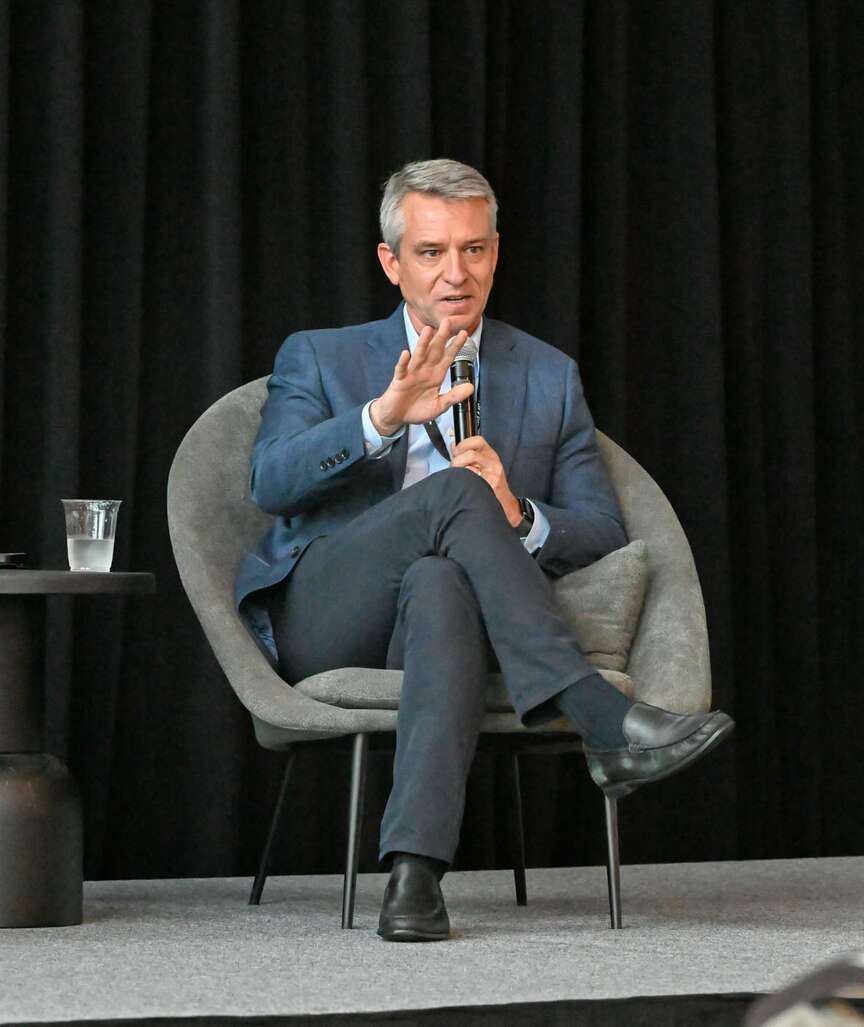 State Rep. Lee Johnson (R-Greenwood) will speak at a subcommittee Wednesday as part of the 2024 Northwest Arkansas Health Summit at Fayetteville Town Center. The primary focus of the summit was to identify and address barriers related to maternal health in Arkansas. For today's photo gallery, visit nwaonline.com/photos. (NWA Democratic Gazette/Caleb Grieger)
State Rep. Lee Johnson (R-Greenwood) will speak at a subcommittee Wednesday as part of the 2024 Northwest Arkansas Health Summit at Fayetteville Town Center. The primary focus of the summit was to identify and address barriers related to maternal health in Arkansas. For today's photo gallery, visit nwaonline.com/photos. (NWA Democratic Gazette/Caleb Grieger)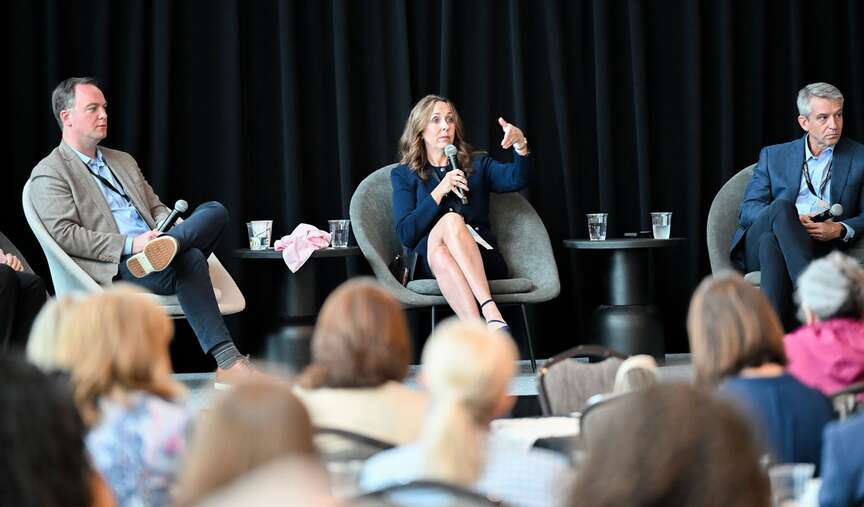 State Sen. Missy Irvin (R-Mountain View) will speak to a subcommittee Wednesday as part of the 2024 Northwest Arkansas Health Summit at Fayetteville Town Center. The primary focus of the summit was to identify and address barriers related to maternal health in Arkansas. For today's photo gallery, visit nwaonline.com/photos. (NWA Democratic Gazette/Caleb Grieger)
State Sen. Missy Irvin (R-Mountain View) will speak to a subcommittee Wednesday as part of the 2024 Northwest Arkansas Health Summit at Fayetteville Town Center. The primary focus of the summit was to identify and address barriers related to maternal health in Arkansas. For today's photo gallery, visit nwaonline.com/photos. (NWA Democratic Gazette/Caleb Grieger)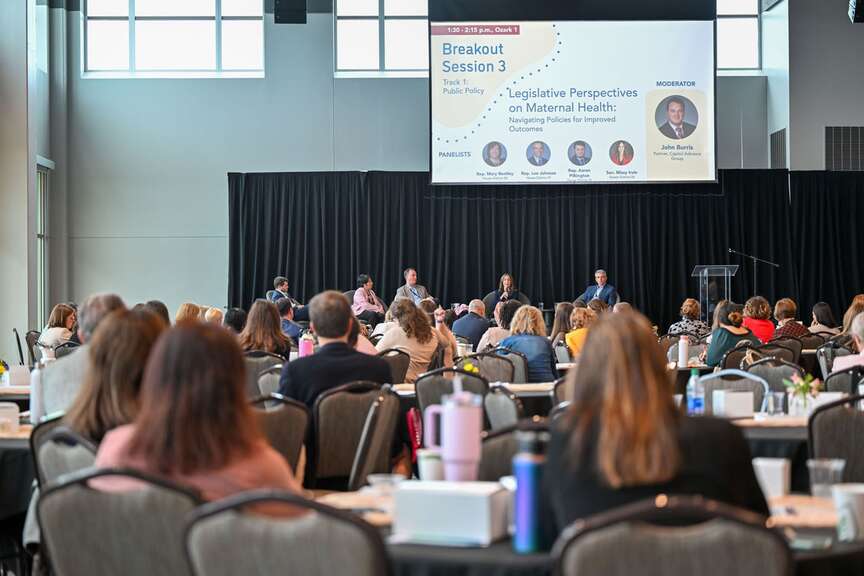 State Rep. Aaron Pilkington (from left), R-Knoxville; State Rep. Mary Bentley, R-Perryville. Host John Burris. State Sen. Missy Irvin, R-Mountain View. State Rep. Lee Johnson (R-Greenwood) spoke to a subcommittee Wednesday as part of the 2024 Northwest Arkansas Health Summit at Fayetteville Town Center. The primary focus of the summit was to identify and address barriers related to maternal health in Arkansas. For today's photo gallery, visit nwaonline.com/photos. (NWA Democratic Gazette/Caleb Grieger)
State Rep. Aaron Pilkington (from left), R-Knoxville; State Rep. Mary Bentley, R-Perryville. Host John Burris. State Sen. Missy Irvin, R-Mountain View. State Rep. Lee Johnson (R-Greenwood) spoke to a subcommittee Wednesday as part of the 2024 Northwest Arkansas Health Summit at Fayetteville Town Center. The primary focus of the summit was to identify and address barriers related to maternal health in Arkansas. For today's photo gallery, visit nwaonline.com/photos. (NWA Democratic Gazette/Caleb Grieger)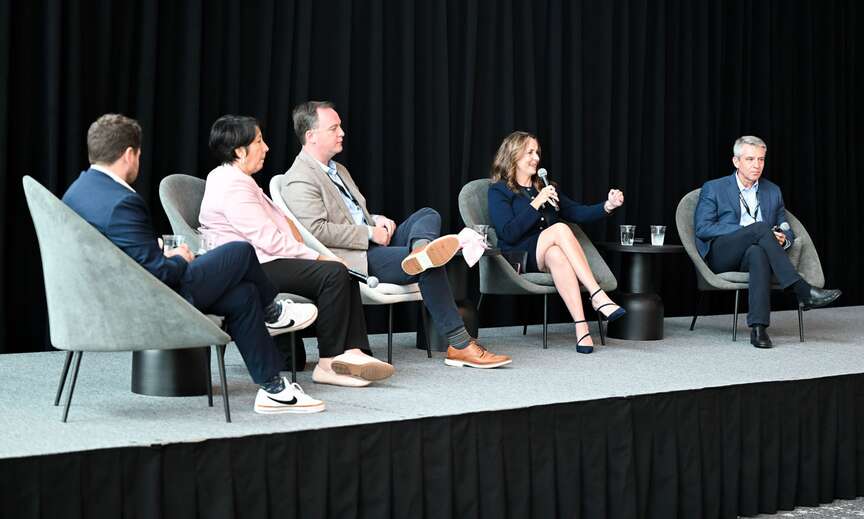 State Rep. Aaron Pilkington (from left), R-Knoxville; State Rep. Mary Bentley, R-Perryville. Host John Burris. State Sen. Missy Irvin, R-Mountain View. State Rep. Lee Johnson (R-Greenwood) spoke to a subcommittee Wednesday as part of the 2024 Northwest Arkansas Health Summit at Fayetteville Town Center. The primary focus of the summit was to identify and address barriers related to maternal health in Arkansas. For today's photo gallery, visit nwaonline.com/photos. (NWA Democratic Gazette/Caleb Grieger)
State Rep. Aaron Pilkington (from left), R-Knoxville; State Rep. Mary Bentley, R-Perryville. Host John Burris. State Sen. Missy Irvin, R-Mountain View. State Rep. Lee Johnson (R-Greenwood) spoke to a subcommittee Wednesday as part of the 2024 Northwest Arkansas Health Summit at Fayetteville Town Center. The primary focus of the summit was to identify and address barriers related to maternal health in Arkansas. For today's photo gallery, visit nwaonline.com/photos. (NWA Democratic Gazette/Caleb Grieger)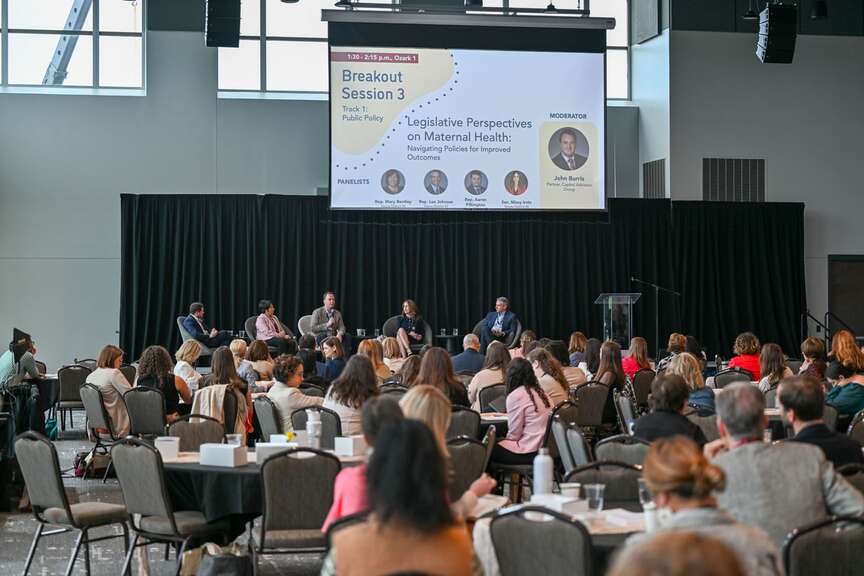 State Rep. Aaron Pilkington (from left), R-Knoxville; State Rep. Mary Bentley, R-Perryville. Host John Burris. State Sen. Missy Irvin, R-Mountain View. State Rep. Lee Johnson (R-Greenwood) spoke to a subcommittee Wednesday as part of the 2024 Northwest Arkansas Health Summit at Fayetteville Town Center. The primary focus of the summit was to identify and address barriers related to maternal health in Arkansas. For today's photo gallery, visit nwaonline.com/photos. (NWA Democratic Gazette/Caleb Grieger)
State Rep. Aaron Pilkington (from left), R-Knoxville; State Rep. Mary Bentley, R-Perryville. Host John Burris. State Sen. Missy Irvin, R-Mountain View. State Rep. Lee Johnson (R-Greenwood) spoke to a subcommittee Wednesday as part of the 2024 Northwest Arkansas Health Summit at Fayetteville Town Center. The primary focus of the summit was to identify and address barriers related to maternal health in Arkansas. For today's photo gallery, visit nwaonline.com/photos. (NWA Democratic Gazette/Caleb Grieger)

